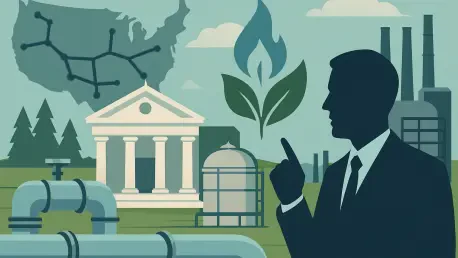Imagine a pivotal moment in U.S. energy regulation where a long-standing effort to modernize natural gas infrastructure reviews is abruptly halted, leaving industry leaders, environmental advocates, and policymakers in a heated debate over the future of energy governance. This scenario unfolded recently when the Federal Energy Regulatory Commission (FERC) decided to end its policy update process, a move influenced by the Department of Energy (DOE). This roundup dives into the varied opinions and insights from multiple stakeholders and experts, exploring what this decision means for the natural gas sector, environmental considerations, and regulatory stability in the United States, the world’s leading LNG exporter.
Gathering Voices on FERC’s Policy Reversal
Industry Support for Regulatory Clarity
Insights from industry representatives highlight a strong preference for maintaining the status quo in regulatory frameworks. Many trade associations representing natural gas and petroleum sectors have expressed relief over FERC’s decision to stick with the 1999 Certificate Policy Statement. They argue that the termination of the update process, which began several years ago, removes a layer of uncertainty that has hindered investment and planning for large-scale infrastructure projects like pipelines and LNG terminals.
A common theme among these groups is the belief that a predictable regulatory environment is essential for sustaining growth in the energy sector. The concern over potential delays and shifting guidelines under a modernized policy has been a significant sticking point, with industry voices emphasizing that the existing framework, while dated, provides a legally sound basis for project approvals.
This perspective also underscores a pragmatic approach to handling modern challenges, with some industry leaders suggesting that case-by-case evaluations under the old policy allow enough flexibility to address specific concerns without overhauling the entire system. Their stance prioritizes operational continuity over sweeping reform.
Environmental Advocates Push for Stronger Safeguards
In stark contrast, environmental and community advocacy groups have voiced deep disappointment with FERC’s decision to abandon the policy update. These stakeholders argue that the 1999 framework fails to adequately address pressing issues such as climate change impacts and community displacement caused by natural gas projects. Their frustration centers on the lost opportunity to embed stricter environmental reviews into the regulatory process.
Many advocates point out that the draft policies introduced a few years back offered a framework to evaluate greenhouse gas emissions and other ecological consequences more thoroughly. The termination, in their view, represents a step backward at a time when global pressure to transition toward cleaner energy sources is mounting, leaving the U.S. potentially out of step with international sustainability goals.
This group also raises concerns about the lack of mandatory guidelines to protect vulnerable communities near proposed infrastructure sites. They contend that without updated policies, FERC’s case-by-case approach risks inconsistent outcomes, potentially overlooking critical social and environmental impacts in favor of expedited project approvals.
Legal and Policy Analysts on DOE’s Influence
Legal and policy experts have focused on the unprecedented role of the DOE in prompting FERC to end the rulemaking process through a directive issued earlier this year. This development has sparked discussions about the shifting dynamics between traditionally independent regulatory bodies and other governmental agencies, raising questions about the future autonomy of FERC in energy policymaking.
Analysts note that while the DOE’s involvement does not immediately alter existing regulations, it sets a precedent for potential interference in areas historically managed solely by FERC. Some suggest that this could lead to a more centralized approach to energy governance, possibly streamlining decision-making but at the risk of reducing the commission’s ability to act independently based on technical expertise.
There is also a debate among these observers about whether this inter-agency shift could foster better alignment on national energy priorities or create conflicts if future administrations push divergent agendas. The consensus leans toward cautious observation, with many urging close monitoring of how this dynamic evolves in the coming years.
Economic Perspectives on LNG Export Implications
Economic analysts have weighed in on how FERC’s decision impacts the U.S. position as the top global LNG exporter, with significant infrastructure already operational and more projects in the pipeline. They argue that reverting to a case-by-case review under the old policy might introduce variability in project timelines and approvals, potentially affecting investor confidence in an industry reliant on long-term commitments.
Some economic voices highlight that while regulatory stability is beneficial for attracting capital, the absence of modernized guidelines could complicate efforts to meet growing international demand for LNG while adhering to evolving environmental standards. This tension between market needs and regulatory adaptability remains a key concern for those tracking the sector’s growth.
Additionally, there is speculation on how this decision might influence domestic energy prices and supply chains. Analysts suggest that without a clear, updated policy, delays or rejections of key infrastructure could create bottlenecks, urging industry players to prepare for a more fragmented regulatory landscape in their strategic planning.
Key Takeaways from the Roundup
Looking back, this roundup captured a spectrum of reactions to FERC’s termination of its natural gas policy update, reflecting a deep divide between industry calls for stability and environmental demands for reform. The unexpected influence of the DOE added a layer of complexity, as legal experts pondered the implications for regulatory independence. Meanwhile, economic analysts underscored the stakes for the U.S. LNG export market. Moving forward, stakeholders across the board should consider engaging more actively with FERC’s case-by-case evaluations to shape outcomes. Policymakers might explore interim measures to address environmental concerns without disrupting the existing framework, and industry leaders could benefit from scenario planning to navigate potential regulatory inconsistencies. Staying informed through regulatory updates and participating in public comment periods will be crucial for all parties to influence the evolving energy policy landscape.









